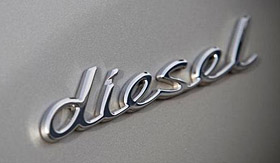 It's been 120 years since Rudolf Diesel fired up his first test engine in Augsburg, Germany, and forever changed the workings of heavy machinery and long-distance transport.
It's been 120 years since Rudolf Diesel fired up his first test engine in Augsburg, Germany, and forever changed the workings of heavy machinery and long-distance transport.The premise was revolutionary, and in many ways, it still is. Diesel's engine ran on thicker oil that was less refined than gasoline; his later prototypes could run on pure vegetable oil and peanut oil. It fired by compression ignition, relying on the heat and high pressure of the surrounding air in each cylinder to ignite the fuel, as opposed to the electric spark needed in a gasoline-powered engine. Fuel could be injected directly into each cylinder rather than the air-fuel mix supplied by carburetors. As a result, Diesel's engine was more than twice as efficient as comparable steam-powered engines, which were still prevalent in the 1890s on ships, railroads and in heavy industry.
By 1912, a year before Diesel died in a mysterious drowning on his way to London, more than 70,000 diesel engines were running around the world. Trains came next, and after World War II, trucks and buses started using diesel power. The Industrial Revolution as we know it might not have happened so quickly were it not for the diesel's prodigious torque, high efficiency and extreme durability.
- Study: Diesel demand to surge, ushering in wave of new U.S. models
- That comes in a diesel? 10 models you might not know about
- Chevy offers a Cruze diesel in Chicago
- 2014 BMW 328d diesel to start at $39,525
With direct fuel injection, which sprays the fuel at very high pressure directly into the combustion chamber, and high compression ratios, ensured by the long piston strokes, a diesel engine needs to be reinforced and very robust. With heavier-duty parts and so much low-end torque, diesel engines can't rev as high, an they don't produce as much horsepower as a comparably sized gasoline engine. But their fuel efficiency, pulling power and long life beat gasoline any day of the week.
In the automotive market, diesel is a major player worldwide, representing more than half the European new car market and a significant chunk of the market in nearly every country. In the United States, new diesels still account for less than 1 percent of the market, primarily due to the engine's dirty reputation for burning a relatively unrefined motor oil. While modern diesels use particulate filters and an array of urea-based injections to snuff out the harmful black soot, only about 73,000 new diesel cars were sold this year through July.
Of those, 78 percent were Volkswagens, with the Jetta TDI scooping up 37 percent of the passenger-car diesel segment. A recent study from the University of Michigan showed that diesel cars, while costing several thousand dollars more, can save drivers from $2,000 to $6,000 in total costs in three and five years of use. But for now, despite a wave of new players like the Chevrolet Cruze Clean Diesel and the Jeep Grand Cherokee EcoDiesel, the engine has a long way to go in this country. Even after 120 years.
Source: MSN
No comments:
Post a Comment